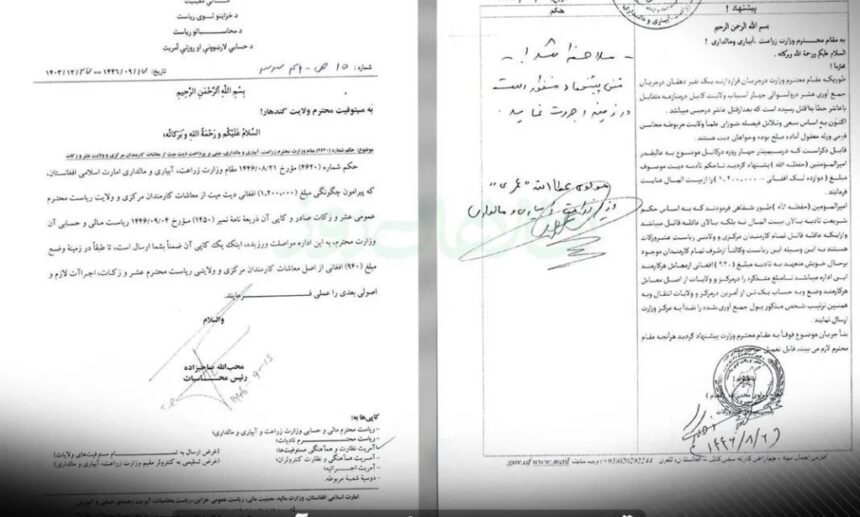RASC News Agency: The Taliban’s Ministry of Finance has issued a directive mandating that blood money (diyya) for a farmer killed during a tax collection operation be paid through salary deductions from employees of the group’s Department of Ushr and Zakat sparking widespread dismay among civil servants and further exposing the group’s arbitrary governance practices. According to well-placed sources, the deceased farmer was fatally shot by a Taliban tax officer during a confrontation in Chahar Asyab district, Kabul province, as officials attempted to forcibly collect religious taxes. The assigned compensation has been set at 1.2 million Kabuli rupees. In response, Taliban authorities have ordered that each employee within the Department of Ushr and Zakat contribute 940 kabuli rupees monthly until the full amount is recovered regardless of their involvement or knowledge of the incident.
Documents reviewed by RASC confirm that the officer involved in the shooting is currently under detention. Meanwhile, the Kabul Council of Ulema and tribal elders have attempted to mediate between the Taliban and the victim’s family, pressing for justice and financial redress. Their appeals reached the Taliban’s reclusive supreme leader, Hibatullah Akhundzada, who reportedly ruled on the basis of his interpretation of Sharia law that blood money must be paid by the killer’s family, not from the Taliban’s public funds. In an effort to circumvent both religious and financial complications, the Taliban’s Ministry of Finance instead imposed a collective penalty on its own employees effectively transferring the burden of accountability onto state workers already suffering under deteriorating economic conditions and meager wages.
This unprecedented decision has drawn sharp criticism from within Taliban ranks and among civil society observers. “This is collective punishment masquerading as religious justice,” a Kabul-based political analyst told RASC, requesting anonymity for security reasons. “It reveals the Taliban’s deeply flawed system of governance, where institutional accountability is nonexistent and lower-level employees are scapegoated for systemic failures.” Despite the public outcry, Taliban officials have not released further information regarding the case, nor have they detailed any formal investigative or disciplinary proceedings. The lack of transparency and procedural justice has only deepened skepticism over the Taliban’s internal governance capabilities.
The incident takes place against the backdrop of an intensifying economic crisis and an erosion of public trust in Taliban authority. By shifting legal and financial responsibility onto ministry staff, the Taliban further expose their inability to uphold basic standards of justice or fiscal responsibility. Their handling of this case underscores not only the regime’s rigid interpretation of Islamic law but also its chronic mismanagement and disregard for administrative fairness.






